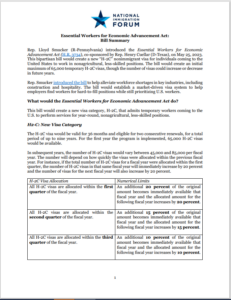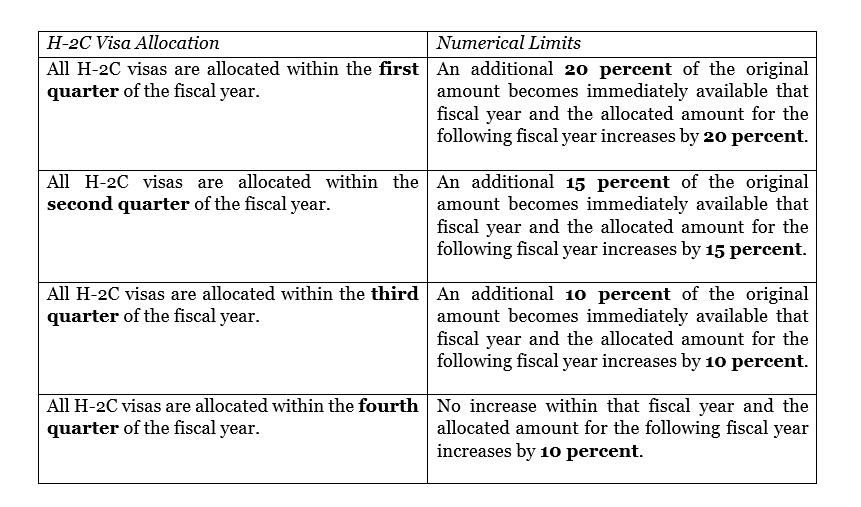 Rep. Lloyd Smucker (R-Pennsylvania) introduced the Essential Workers for Economic Advancement Act (H.R. 3734), co-sponsored by Rep. Henry Cuellar (D-Texas), on May 25, 2023. This bipartisan bill would create a new “H-2C” nonimmigrant visa for individuals coming to the United States to work in nonagricultural, less-skilled positions. The bill would create an initial maximum of 65,000 temporary H-2C visas, though the number of visas could increase or decrease in future years.
Rep. Lloyd Smucker (R-Pennsylvania) introduced the Essential Workers for Economic Advancement Act (H.R. 3734), co-sponsored by Rep. Henry Cuellar (D-Texas), on May 25, 2023. This bipartisan bill would create a new “H-2C” nonimmigrant visa for individuals coming to the United States to work in nonagricultural, less-skilled positions. The bill would create an initial maximum of 65,000 temporary H-2C visas, though the number of visas could increase or decrease in future years.
Rep. Smucker introduced the bill to help alleviate workforce shortages in key industries, including construction and hospitality. The bill would establish a market-driven visa system to help employers find workers for hard-to-fill positions while still prioritizing U.S. workers.
What would the Essential Workers for Economic Advancement Act do?
This bill would create a new visa category, H-2C, that admits temporary workers coming to the U.S. to perform services for year-round, nonagricultural, less-skilled positions.
H2-C: New Visa Category
The H-2C visa would be valid for 36 months and eligible for two consecutive renewals, for a total period of up to nine years. For the first year the program is implemented, 65,000 H-2C visas would be available.
In subsequent years, the number of H-2C visas would vary between 45,000 and 85,000 per fiscal year. The number will depend on how quickly the visas were allocated within the previous fiscal year. For instance, if the total number of H-2C visas for a fiscal year were allocated within the first quarter, the number of H-2C visas in that same fiscal year will immediately increase by 20 percent and the number of visas for the next fiscal year will also increase by 20 percent.

In certain circumstances, the maximum number of 85,000 visas in one fiscal year could be increased by up to 5 percent.
H-2C Nonimmigrants
Individuals would be eligible for an H-2C visa if they have: (1) received an offer of employment from a registered employer, and (2) met the requirements below:
- Submit an application with an attestation stating that they will:
- Report to their registered position within 14 days of admittance;
- Accept only registered positions held by registered employers; and,
- Only bring a spouse or children to the U.S. if they have received an offer of employment from a registered employer;
- Pass a criminal background check; and,
- Pay the processing and general fees for the application, which will be determined by the Secretary of the Department of Homeland Security (DHS).
Once a temporary worker receives an offer of employment from a registered employer, they are eligible for H-2C nonimmigrant status. But the temporary worker is ineligible for an H-2C nonimmigrant status if the individual:
- Is otherwise inadmissible;
- Fails to pass a criminal or national security background check; or,
- Comes from a country that the Secretary of State determines supports international terrorism.
H-2C nonimmigrants would be treated as full-time employees but not be eligible for certain tax credits, including the premium assistance tax credit and the tax credit under sections 24 or 32 of the Internal Revenue Code. Employers may promote an H-2C nonimmigrant if the individual has worked in the registered position for at least 12 months. H-2C nonimmigrants would be able to travel outside the U.S. during the duration of their visa.
H-2C visa holders would be eligible to move between registered positions or registered employers, but they cannot be unemployed for more than 45 consecutive days. If unemployed for 45 consecutive days, the H-2C nonimmigrant’s visa will expire, and they must leave the U.S.
Registered Employers
An employer must register for the H-2C program. Employers are ineligible to register if they have made fraudulent statements in their application or committed serious offenses. An eligible employer may renew their status as a registered employer. Each term begins on the status approval date and ends at either (a) the end of 3 years, or (b) 3 months after the employer has no registered positions left.
Registered employers must pay certain fees, including an application fee and a ‘scarcity recruitment’ fee. The application fee for obtaining a registered employer status is $500 per employer and must be paid every three years. The scarcity recruitment fee is 5 percent of an H-2C nonimmigrant’s estimated annual compensation, which is meant to demonstrate the employer’s inability to hire a U.S. worker. The Secretary may reduce the scarcity recruitment fee by 5 percent for each day the position’s application is delayed.
Registered Position
Once an employer is registered, they may apply to have a position registered under the program to then hire an H-2C nonimmigrant temporary worker. Employers must advertise these positions before they are registered. These advertisements must be posted on the employer’s website, on job search engines, and in local newspapers, among other places, for at least 30 days.
While registered positions can be obtained by all businesses, the Secretary must reserve at least a quarter (25 percent) of all registered positions for small businesses. A registered position cannot be an occupation that is classified as requiring a bachelor’s degree or higher levels of education.
Restrictions
There are multiple restrictions governing how H-2C nonimmigrants may come to the U.S. to work and how registered employers may hire H-2C employees, including:
- Employers may not lay off U.S. workers to hire H-2C nonimmigrant workers;
- Employers may not underpay temporary workers and when employers submit applications for registered positions, they must include a section on the average pay for that field;
- H-2C nonimmigrant workers are only permitted in “full employment areas,” defined as:
- A county or metropolitan statistical area with an unemployment rate during the relevant fiscal quarter that is less than or equal to 7.9 percent;
- There is no equally or better qualified U.S. worker who has applied for the position or the position is classified as an enduring job opening, which in general means it has been unfilled for more than 60 days in a 90-day period;
- The employer must have a clean record concerning payroll taxes and fair labor practices; and,
- There is no ongoing strike, lockout, or labor dispute.
Penalties
If the temporary worker fails to comply with the conditions of their H-2C status, then the Secretary shall:
- Revoke the employment authorization; and,
- Initiate and pursue removal proceedings.
The DHS Secretary may impose civil and/or criminal penalties for certain violations. General penalties against the employer may include the payment of back wages and benefits, as well as fines up to $5,000 for certain civil violations. Criminal penalties for employers and employees would include:
Bill’s Passage
Once the bill passes, the Director of the Bureau of the Census shall submit a report to Congress that includes:
- An estimate of how many legal and undocumented immigrants are living in the participating counties and metropolitan statistical areas where H-2C workers are present, and whether the number has changed since the beginning of the H-2C program;
- The impact of H-2C nonimmigrants on employment, wage rates, and housing prices; and,
- The impact on the criminal justice system and healthcare system in participating areas.
What are the Potential Benefits of this Bill?
The bill would create a new avenue for individuals to come and work legally in the United States. By utilizing the H-2C program, U.S. businesses, temporary nonimmigrant workers, and U.S. workers could all benefit from a more robust and vibrant economy.
Helps Fill Critical Workforce Gaps. This bill would allow employers in the U.S. to expand their workforce and benefit from filling open, hard-to-fill positions. The DHS Secretary must prioritize small businesses when assigning temporary workers to registered positions. By connecting employers with ready employees, costly delays due to workforce shortages would be mitigated, and economic development would continue. Because registered employers must apply for positions, employers must include the temporary workers’ anticipated wages. This would ensure that workers are fairly compensated for their work and that their wages do not impact the wages of U.S. workers.
Alternative Legal Pathway. Granting individuals an additional legal avenue to come to the U.S. is a favorable alternative to unauthorized migration. Promoting a visa where individuals may come to the U.S. seeking work opens new and safe opportunities for migrants with the skills and drive to work in the country. Once in the U.S., they can stay for 36 months (about three years) and potentially renew their temporary work visas for a total period of up to nine years.
Protects American Workers. Employees may not hire temporary workers if qualified U.S. workers are ready and willing to fill such a position. If unemployment is high in an area, employers cannot register positions for H-2C nonimmigrants, meaning they must hire U.S. workers. Therefore, these registered positions are not minimizing opportunities for U.S. workers. Rather, this bill allows immigrants to work for American businesses and benefit the U.S. economy by expanding the workforce specifically in areas with high workforce shortages and low unemployment.
The National Immigration Forum would like to thank Ariana Asefi, Policy and Advocacy Intern, for developing this bill summary.

